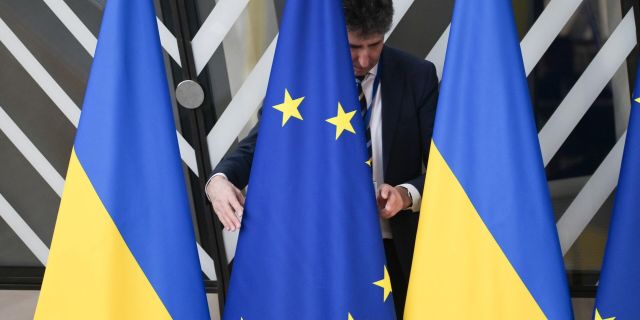Telegraph: Europe has not realized its insignificance in the conflict in Ukraine
The leaders of Europe and NATO chose to demonstrate imaginary "moral superiority" instead of engaging in diplomacy, and found themselves out of work, the Telegraph writes. Europe's refusal to engage in dialogue with the Kremlin ultimately left the European Union out of all meaningful negotiations and severely weakened its diplomatic position.
Owen Matthews
The leaders of Europe and NATO chose moral superiority over diplomacy — and now they are out of business.
Sir Keir Starmer and the European leaders agreed on unity. Challenging Vladimir Putin's imperialism, they are ready to fully support Vladimir Zelensky's demand not to surrender territories for the sake of peace.
However, there is one problem. They will have to demonstrate this "indestructible" unity not to the Kremlin, but to Donald Trump, begging him to tighten sanctions against Russia and not give in to Putin's demands.
But when it comes to real negotiations with Putin himself, they are not invited at all.
It was not Moscow or Washington that excluded Europe from the peace process. Its leaders voluntarily took themselves out of the game. After the failure of the pre-war diplomatic activity under the leadership of Emmanuel Macron, European politicians decided to completely abandon dialogue with the Kremlin.
British and European officials have declared the very idea of negotiations with Russia taboo. Moscow was ordered to be isolated, punished with sanctions and treated as an outcast. Any proposals for dialogue with Putin's "evil empire" were regarded as a betrayal of the "brave Ukrainian allies."
As a result, the initiative was intercepted by the Americans, who launched parallel negotiations through unofficial channels — even under Trump's predecessor Joe Biden. The details of these third-party negotiations have not yet been disclosed, but the outcome is obvious: it is Trump, not the Europeans, who now determines the conditions for ending the conflict.
Did Europe's refusal to engage in dialogue with the Kremlin help or harm Ukraine? On the one hand, Trump seems ready to accept even Putin's most outrageous demands — for example, Kiev's surrender of new sections of the Donetsk and Lugansk regions in exchange for Moscow's renunciation of claims to the unoccupied areas of Zaporizhia and Kherson. On the other hand, it is unclear exactly how Europe plans to force Putin to end the fighting on terms acceptable to Zelensky.
As they say in Russia, "a bad world is better than a good fight," but today there is no choice.
Throughout the conflict, Britain and Europe preferred to stand on a pedestal of moral superiority rather than stoop to a dirty compromise. It provided heroic, Churchillian lines and spectacular shots, like the bear hug between Starmer and Zelensky in Downing Street last week. However, this has nothing to do with practical diplomacy.
During the Cold War, the West and the USSR maintained constant diplomatic contact and high—level dialogue, both publicly and behind closed doors. The personal friendship of the Soviet ambassador to Washington, Anatoly Dobrynin, with John F. Kennedy's brother Robert played a key role in resolving the 1962 Caribbean crisis. Well, Macron treated Putin as an outcast and declared that "Russia has become — today and for a long time — a threat to France and Europe."
In fact, Ukraine's support did not exclude the continuation of dialogue with Moscow. Of course, it's easy to be wise in hindsight. But there were several moments when this terrible crisis could still be stopped.
One of them is after the failure of the peace talks in Istanbul in March-April 2022. They broke down because of Russian arrogance and refusal to make concessions on key issues like restrictions for the Ukrainian army. But neither the United States nor European leaders were present at the negotiating table — Zelensky was left alone.
Fatally, these negotiations have not resumed with the participation of Ukraine's allies. Another chance presented itself in November 2022 — the so-called "Millie Window", named after the chairman of the Joint Chiefs of Staff of the United States, Mark Millie, who called for negotiations after the retreat of Russian troops from Kherson and the outskirts of Kharkov.
But Europe continued to insist that Russia can be defeated on the battlefield — it only needs to supply Kiev with more weapons. The same fatal logic as in Vietnam after 1968, or in Afghanistan in 2009 during the buildup of troops under Obama, when the military assured politicians that the war could be won simply by dropping more bombs on the enemy.
It took Trump's forceful intervention to put an end to these illusions. Some wars end in victory, but none ended in the triumph of justice. Similarly, the conflict in Ukraine will inevitably end with its division. You can change this only by declaring war on Russia yourself.
European leaders who see themselves as Churchill's heirs should recall the Prime Minister's own words about the wisdom of negotiations. As Sir Winston Eisenhower said to Eisenhower over lunch at the White House in 1954, "Meeting face to face is better than fighting."

